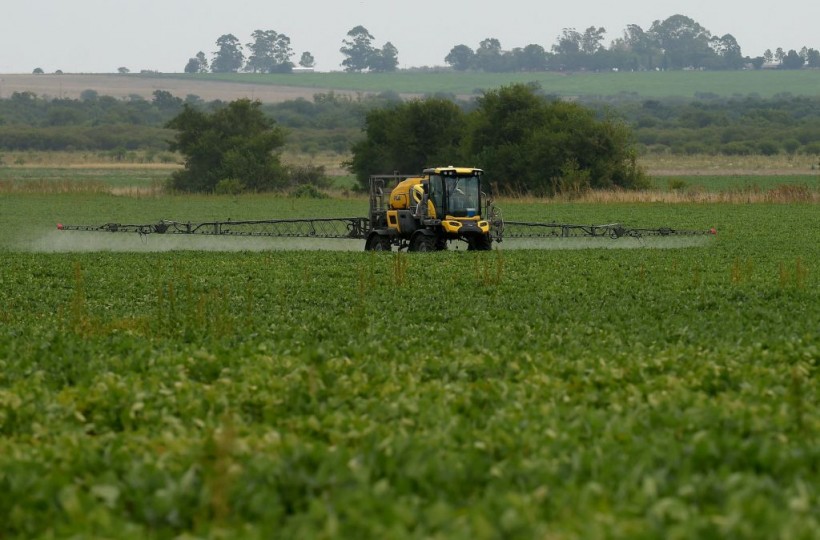Researchers in France believe they have discovered a natural alternative to artificial fertilizers. Because of an unexpected element - human urine - their discovery decreases pollution and aids in the feeding of a rising worldwide population.
Synthetic nitrogen fertilizers increase agricultural productivity and harm the environment if used in excess. Their prices skyrocket, especially now that Ukraine is embroiled in a civil war. Scientists are now looking for a solution to this confluence of challenges abroad.

A soybean field is fumigated near Urdinarrain, Entre Rios province, Argentina, on February 8, 2018. - Soybean fields in Argentina are often fumigated with glyphosate, a herbicide which is probably carcinogenic according to the World Health Organization (WHO), but which is needed to maintain crops of transgenic seeds. The first trial for the possible effects of Round Up -Monsanto's polemic herbicide containing gliphosate- starts on July 9 in the US.
Scientists To Use Urine Instead of Artificial Fertilizers
In the age of modern agriculture, human urine may appear to be a rudimentary manner of fertilizing plants. Still, as academics explore ways to lessen dependency on chemicals and reduce pollution, some are becoming increasingly interested in the possibilities of pee.
Plants require minerals such as nitrogen, phosphate, and potassium, which we get through food before "excreting, primarily through urine," according to Engineer Fabien Esculier.
France 24 said Esculier runs the OCAPI research program in France, which studies food systems and waste management.
Synthetic nitrogen fertilizers, which have been in use for over a century, have aided in increasing yields and increasing agricultural production to feed a growing human population.
However, when used in excess, they end up in river systems and other bodies of water, generating suffocating algal blooms that can kill fish and other aquatic life.
According to the United Nations, agricultural ammonia emissions can mix with automobile fumes to cause severe air pollution.
Chemical fertilizers also emit nitrous oxide, a powerful greenhouse gas contributing to climate change.
However, pollution does not just originate from the crops.
ALSO READ: Scientists Working on Converting Astronaut Urine Into Rocket Fuel Using Sunlight
To replace chemical fertilizers, experts would require several times the weight of treated pee.
How to Make Fertilizer from Urine
Esculier explained in a Euro News report that plants require fertilizers, nitrogen, phosphorous, and potassium to thrive. He said people consume these nutrients before"excreting them, typically through urine.
Separating and collecting pee at the source necessitates a rethinking of toilets, the wastewater collection system, and the dispelling of some preconceived notions.
In the early 1990s, scientists first trialed urine separation from toilets in Swedish eco-villages, Switzerland and Germany. Experiments are presently being conducted in the United States, South Africa, Ethiopia, India, and Mexico, among other countries.
Urine must be carried to the fields once it has been collected. However, the surgery is still costly. It can be reduced in volume, concentrated, or even dehydrated using a variety of procedures.
Because pee isn't usually a major vector of disease, it doesn't need to be processed extensively before being used in agriculture. Allowing it to rest is recommended by the World Health Organization (WHO), although it can also be pasteurized.
Projects are forming in Dol-de-Bretagne, Paris, and Montpellier, France.
The earliest toilets with a urine divider were seen as inconvenient and unattractive. However, a new model created by the Swiss firm Laufen in collaboration with Eawag has received positive feedback.
Fabien Gandossi, the owner of the 211 restaurant in Paris, installed this innovative, dry type that collects urine in his company.
According to the same Euro News report, Gandossi has received mostly good reviews. He says people are astonished, but they don't notice much of a change compared to the old system.
BONUS QUESTION: How Long Can You Live By Drinking Urine Alone?
At most, an extra day or two. Slate says urine from a healthy individual is roughly 95% water and sterile, so it's safe to consume and replaces lost water in the short term. However, the remaining 5% of urine is made up of a variety of waste chemicals, including nitrogen, potassium, and calcium, all of which can be problematic in excess.
When you drink your urine, everything your kidneys tried to evacuate returns to your stomach, and much of it ends up in your kidneys again. Your urine will become extremely concentrated with harmful waste products after many days, and drinking it might produce symptoms identical to those caused by complete renal failure. You're doomed either way at that moment, from dehydration on one hand or renal failure on the other.
RELATED ARTICLE: Cow Dung Once Believed to Treat COVID-19, Now Found Responsible for Deadly Black Fungus Epidemic in India
Check out more news and information on Agriculture in Science Times.














